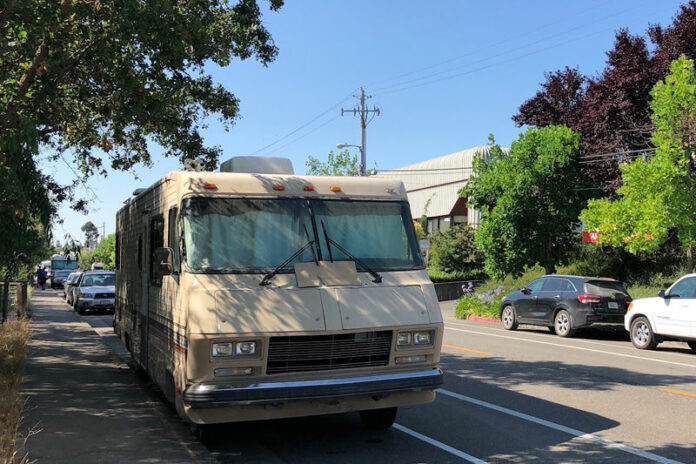
Things are looking up for people living tenuously in their RVs on Morris Street who may move into the RV park village program approved Tuesday, Dec. 7 by the Sebastopol City Council.
The council unanimously adopted a resolution and agreement with Sonoma Applied Village Services (SAVS) for the pilot program at the 845 Gravenstein Highway North, owned by St. Vincent de Paul Sonoma County (SVDP). Adrienne Lauby, SAVS board president, introduced Hector Gutierrez as the village project’s site manager.
With many community members in opposition to the RV park over the past month, Lauby and council members acknowledged the accelerated process to approve the program originally pictured to develop in the city’s public works storage yard by Morris Street.
The city found the costs to prepare the yard for an RV Park to be unworkable in a matter of weeks, around which time SVDP offered to lease its soon-to-be property on Gravenstein Highway North for a year to the pilot program.
Like locals against the first potential site, the community near the Gravenstein Highway North location also feared for the safety of schoolchildren, the character of the area and theft risks.
According to Councilmember Diana Rich, SAVS must deliver a quarterly report to the council including any security incidents, conflicts, complaints and any residents unenrolling from the village.
Lauby stated that the village will not accept sex offenders and that while SAVS will screen for that, the Sebastopol Police Department had also informed her there are no registered sex offenders currently living on Morris Street.
SAVS will have hired security for the first 30 days of the program, to reduce their presence later to the village’s curfew hours from 10 p.m. to 6 a.m., according to Lauby. She added that SAVS will be working with the community on such matters and consider whether or not the village calls for more security.
The organization has also agreed to meet with a community advisory committee yet to be created on a monthly basis at least, likely more often in the early stages of the program. In addition, the RV park village is to have a 24/7 hotline for the village manager or on-site manager to respond to any concerns the surrounding neighborhood may have.
Lauby stated security would be positioned at the front locked gate of the village. During curfew hours, residents who are granted the privilege can come and go with staff permission, but they must return so their exit and entry is properly logged.
The intake process to live in the safe parking community includes signing a contract agreeing to village rules to be enforced by a resident council village manager, on-site manager up to the SAVS board. Residents also agree to “consequences,” like the zero-tolerance policy and possible expulsion over the core four: no violence, no open fires, no weapons and no drug-dealing.
It’s not all hard edges. The intake process includes setting personal goals and identifying the steps to reach them so that residents may ultimately move into more secure housing and another can take their place in the village, Lauby said.
Other details she communicated to the public were that the site would stay neat and support cleanliness, with compost, garbage and recycling available and a requirement to do a minimum of six hours picking up trash and maintaining the village each month. Quiet hours run from 10 p.m. to 8 a.m.
Though residents could have a lawn chair by their RV, staff would not allow piles of garbage to form, Lauby said. All vehicles, from RVs to staff and transportation vehicles like cars and trucks, are to be parked on site, not on the street.
Trespassing onto school property like the Sebastopol Charter School is also prohibited. Rich recounted conversations with the school’s executive director, Chris Topham, who struggled to get an adequate response or support to address an unhoused person who would lean on the school fence on county lands.
Rich said Lauby offered for SAVS to act as a resource to the community on issues connected to unhoused populations, even if the issue does not involve anyone living in the RV park village. That service was made official in the city’s agreement with SAVS.
The council also amended that the resolution be revised to correctly state the program’s sources of funding. Rent to St. Vincent is roughly $60,000 for the year, which would have come from the city’s own budget if the Board of Supervisors hadn’t granted $80,000 that very afternoon.
That funding for the 22-space safe parking program is to support the project through to the end of 2022, according to a Dec. 9 county press release. It’s one portion of the $2 million the supervisors awarded in the past week to projects helping homeless people transition towards permanent supportive housing in Guerneville, Sonoma, Santa Rosa and Petaluma as well.
“We need to explore every creative opportunity that we have because we continue to have a crisis on the streets of Sonoma County,” the press release quoted from Lynda Hopkins, chair of the Board of Supervisors.
The ad hoc committee for the unhoused — Councilmembers Una Glass and Diana Rich — are set to return to the council with their recommendations on spending the remaining $20,000 as the program moves forward. Last, council members agreed to drop the word “recreational” in reference to fires in the fire and safety plan of the village policies.








